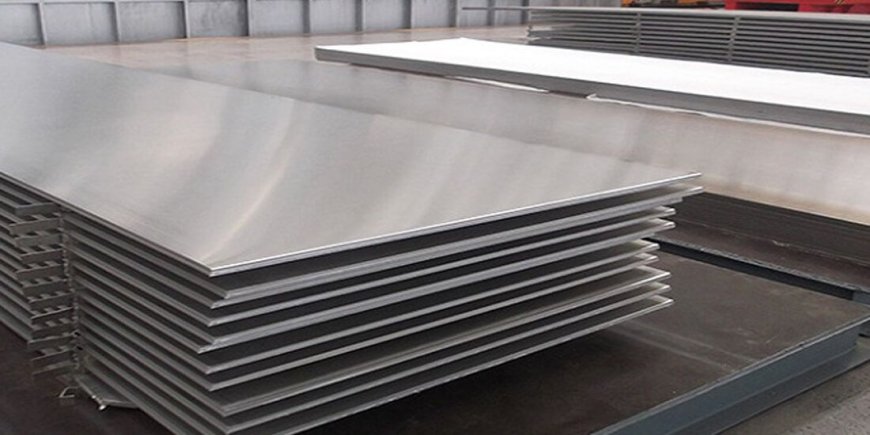Nickel Sheet: Properties, Characteristics, and Applications
Discover the properties, characteristics, and applications of nickel sheets, a versatile material used across industries for its corrosion resistance, high-temperature stability, and durability.

Nickel sheets are a versatile and widely used material in various industries due to their excellent properties and characteristics. Nickel, a transition metal, is known for its resistance to corrosion, high melting point, and durability. These properties make nickel sheets an ideal choice for applications in harsh environments where other materials may fail. This blog will delve into the properties, characteristics, and applications of nickel sheets, highlighting why they are a crucial material in many industrial processes.
Properties of Nickel Sheets
Corrosion Resistance:
Nickel sheets exhibit exceptional resistance to corrosion, especially in environments that are highly acidic or alkaline. This makes them ideal for use in chemical processing and marine applications where exposure to corrosive elements is common.
High Melting Point:
Nickel has a high melting point of around 1455°C (2651°F), making nickel sheets suitable for high-temperature applications. They maintain their structural integrity and do not easily deform or degrade under extreme heat.
Electrical and Thermal Conductivity:
Nickel sheets possess good electrical conductivity, making them useful in electronic applications. Additionally, they have excellent thermal conductivity, allowing them to efficiently transfer heat in applications such as heat exchangers and furnace components.
Magnetic Properties:
Nickel is ferromagnetic, meaning it can be magnetized and attracted to magnets. This property is useful in applications requiring magnetic materials, such as in sensors, magnetic shielding, and electronic devices.
Ductility and Malleability:
Nickel sheets are highly ductile and malleable, meaning they can be easily formed into different shapes without breaking. This makes them ideal for fabrication processes such as stamping, drawing, and rolling.
Resistance to Oxidation:
Nickel sheets are resistant to oxidation at high temperatures, which helps prevent the formation of scale and maintains the material's surface integrity. This property is especially beneficial in high-temperature industrial processes.
Characteristics of Nickel Sheets
Purity and Alloying:
Nickel sheets can be manufactured in pure form or as part of various nickel alloys. The addition of elements like chromium, molybdenum, and iron can enhance specific properties, such as corrosion resistance, strength, and heat resistance, depending on the application requirements.
Surface Finish:
Nickel sheets are available in a range of surface finishes, from matte to bright. The choice of finish depends on the intended use, with polished surfaces often used for aesthetic applications and rougher finishes for industrial purposes.
Thickness and Dimensions:
Nickel sheets are produced in various thicknesses and dimensions to suit different applications. They can be as thin as a few micrometers for precision applications or several millimeters thick for structural uses.
Weldability and Fabrication:
Nickel sheets are highly weldable and can be easily fabricated using standard welding techniques. This makes them versatile in manufacturing processes, allowing for the creation of complex assemblies and structures.
Applications of Nickel Sheets
Chemical Processing:
Nickel sheets are extensively used in the chemical processing industry due to their resistance to corrosive chemicals. They are used in the fabrication of equipment such as reactors, storage tanks, heat exchangers, and piping systems that handle acids, alkalis, and other aggressive chemicals.
Aerospace and Aviation:
In the aerospace industry, nickel sheets are used in fabrication of engine parts, turbine blades and heat claws because of their high heat and oxidation resistant qualities. They compete favourably well for use in harsh aerospace applications due to their significant strength and sturdiness.
Electronics and Electrical Engineering:
Nickel sheets are used in various electronic components, including batteries, connectors, and shielding materials. Their good electrical conductivity and magnetic properties are particularly valuable in these applications.
Automotive Industry:
The automotive industry uses nickel sheets in the production of exhaust systems, catalytic converters, and heat shields. Nickel’s high-temperature resistance and corrosion resistance ensure long-lasting performance in these components.
Marine Engineering:
Nickel sheets are commonly used in marine applications, including shipbuilding and offshore structures, due to their excellent resistance to seawater corrosion. They are also used in desalination plants, where they help to withstand the harsh saline environment.
Power Generation:
In power generation, nickel sheets are used in nuclear reactors, steam generators, and other high-temperature equipment. Their ability to endure extreme temperatures and corrosive environments is crucial for the safe and efficient operation of power plants.
Medical Equipment:
Surgical instruments, implants, and medical devices are some of the products where Nickel sheets are used when producing a medical product. Their biocompatibility and resistance to corrosion ensure that they can safely be used in medical applications.
Architecture and Design:
Nickel sheets are also used in architectural applications, such as cladding, roofing, and decorative elements. Their durability, resistance to weathering, and aesthetic appeal make them a popular choice for modern building designs.
Conclusion
Nickel sheets are a versatile material with a wide range of applications across various industries. Their unique properties, such as corrosion resistance, high-temperature stability, and excellent mechanical strength, make them indispensable in environments where other materials may fail. Whether in chemical processing, aerospace, electronics, or marine engineering, nickel sheets provide reliable performance and long-lasting durability. Understanding the properties and applications of nickel sheets can help industries select the right material for their specific needs, ensuring efficiency, safety, and cost-effectiveness.
What's Your Reaction?



















